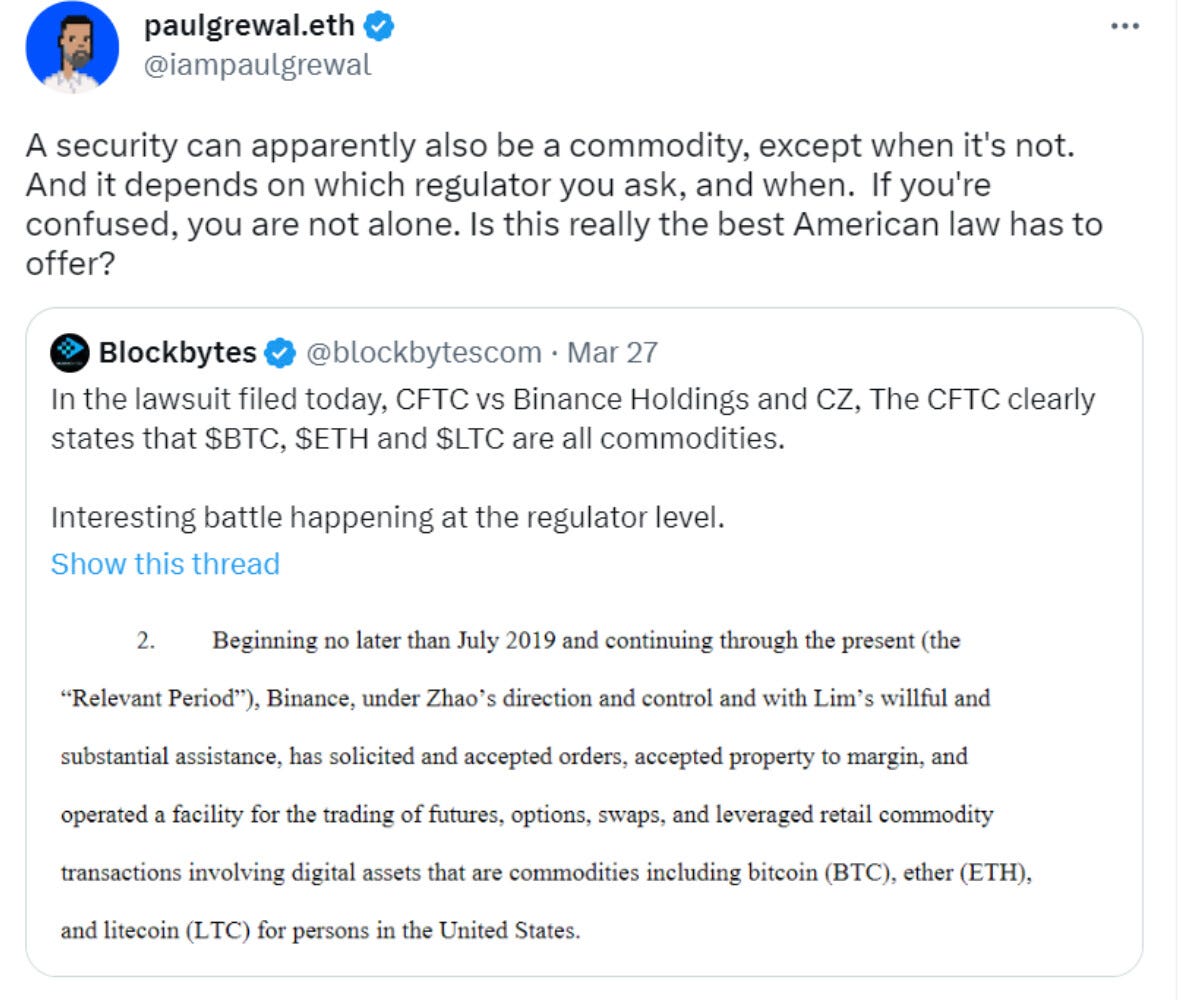Fintech Horror Stories - Guest Writer Nakul Natrajan - Fighting Through the Snow with Crypto
In today’s piece, our guest writer talks about the state of crypto post-recent events.
Today’s piece is written by guest writer Nakul Natrajan, who is a fintech risk expert who hails from Toronto and is a recent graduate of the Schulich School of Business - York University. We connected during our coverage of the SVB events and I’ve appreciated his engagement and awesome insights on my personal posts and interest in the newsletter. As mentioned a few weeks ago, I’m out of the country and occupied in observing Ramadan so I’m opening up the newsletter to friends and fellow enthusiasts to share their views. If you want to learn more about what I’m up to during Ramadan, click here. With that said, let’s kick it over to Nakul:
With fleeting but retreating glimmers of hope, the end of this winter seems to be colder and longer than most others, for the world of Cryptocurrency. One blow after another, intended to take the wind out of every crypto-bros' sails, may set a rhetoric for how the world digests and consumes developments associated with this digital asset class. Or else, the ' Crypto revolution may not be televised' but one may beckon!
In an environment characterized by bank failures, starting with Silvergate Bank on March 8 (which ironically enough, has been a cornerstone in the crypto world) and ending with the sale of Credit Suisse to UBS on March 20, the confidence in cryptos, using BTC as a proxy, had started to come back.
High interest rates, central banks not running out of printer ink any time soon, soaring inflation and the likes, made a strong case for the devaluation of the dollar as a sustainable means of value. To add to that the threat of 'De-dollarization' was looming on the horizon with talks of a Yuan based trade agreement between China and Russia.
In ringing the economic alarm bells, Balaji Srinivasan, the former CTO of Coinbase and General Partner at Andreessen Horowitz, went as far to say that the US is on the runway to hyperinflation. On these grounds, he went one step further and said that BTC, in realizing its value as a safe haven asset during these economically tumultuous times, would hit the $1 million mark by June 17. To put his money where his mouth is and to make for some pretty entertaining Fintwit content, he even took on a high-stake bet with a certain Mr. Medlock that went on to demonstrate how convinced he is of this eventuality.
Call it a glorified 'pump and dump' or call it a virtuous act of honor and conviction, Balaji's reasons are not all wrong.
When problems for U.S. banks boiled over last week with the wind down of Silicon Valley Bank, that led to pressure on other Banks including Signature, First Republic, and other names, on fears that uninsured deposits could be locked up or lose value.
With events such as these demonstrating larger more systemic failures, how would the dollar hold on to its purported image of stability, impartiality, and balance? If losses are hidden under the carpet and / or just absorbed by the State every time institutions and / or their regulators fail to perform their fiduciary duty, will the greenback be able to retain its trust?
This problem may not be specific to just the dollar as fiat currencies over the world may have to contend with a similar mess, Central Bankers world over may have caused, on the back of the Pandemic. Launching CBDCs or implementing new real time payment rails may not be adequate as far as being able to get a quick image makeover may be concerned.
Instead of winning one back on its own accord in what may be extremely complex situations for these centralized institutions, is the old guard addressing pangs of insecurity by bullying the 'new guy'?
On February 7, 2023, this year, Ishan Wahi, a former product manager at Coinbase, pled guilty to two counts of conspiracy to commit wire fraud, (not Securities Fraud!) in connection with a scheme to commit insider trading in cryptocurrency assets. Heralded as the first-ever cryptocurrency insider trading case in the official press release by the US Justice department, the case gained more prominence when the SEC chose to prosecute Ishanon civil charges as well, citing a breach of securities laws.
Prosecution of executives for insider trading is not necessarily headline news – except when the prosecution involves the SEC wading deep into the waters of defining crypto as a security while the exchange these securities were listed on classifies them as 'digital assets'. The SEC hopes that with a favorable decision from the courts on this case, a legal precedent would have been set as far as its control (by way of regulation) on this asset class may be concerned in the future. The Wall Street Journal describes SEC v/s Wahi as the crypto industry’s best hope for beating back the commission’s campaign to regulate digital assets. Regulation wouldn't be all bad if nuances specific to this digital asset class were respected by the regulators. As per the article, the industry hopes federal judges will find that crypto is too different from traditional stocks and bonds to fall under rules written for Wall Street.
Word on the street however is that Ishan's chances against the SEC seem to be as slim as they are for his former employer, who also got news on the 22nd of March, that it was at the receiving end of a Wells notice from the SEC (an action which typically precedes an enforcement action) on its staking and asset listing practices. At this point, it sounds reasonable for one to think – why would the SEC go after the one exchange that chose to engage in constructive dialogue and chose to legitimize its operations by listing itself as a public entity? I don't recall hearing of any regulatory scrutiny about FTX's advertisements, or its massive sponsorship deals when it operated as an unregulated entity. Why does Coinbase get all this heat? Seems like a trigger-happy pursuit to nipping something in the bud as opposed to engaging in thoughtful dialogue with a willing adversary.
Either way, Brian Armstrong at Coinbase shouldn't feel like he's the only one left in the cold because fellow crypto CEO, Changpeng Zhao is also being sued by the Commodity Futures Trading Commission (CFTC) in the United States for operating what the regulator alleges is an "illegal" exchange and a "sham" compliance program.
Here's the Chief Legal Officer of Coinbase poking some fun (or releasing some angst ?!) at this development.
If you thought this crusade against Cryptocurrencies ends here – you're in for a surprise! This may be just the start.
- On the 23rd of February, the IMF laid out a nine-point action plan for how countries should treat crypto assets, with point number one a plea not to give cryptocurrencies such as Bitcoin legal tender status.
- On the 23rd of March, the SEC issued an investor alert urging caution around crypto asset securities.
- On the 26th of March it was reported that the next G7 meeting in Japan might bring a push from the 7 biggest democracies for tougher regulations on cryptocurrencies around the world.
- Another report coming out of the UK claims that U.K. crypto companies are finding it difficult to obtain banking services because numerous banks are limiting their interaction with the sector altogether.
- If you have a sense of humor about this you may enjoy this one, on March 24, the United States Federal Reserve released an 86-page report detailing the reasons for denying Custodia Bank’s application for membership citing concerns about banks with business plans focused on a narrow sector of the economy. I'd have given it at least a month till the collapse of SVB before citing concentration of the depositor base as a reason for rejection. Important to note here that Custodia claims to have a fully reserved business model wherein a hold of $1.08 is instated to back every dollar deposited by customers.
Law firm, Cooper & Kirk has titled this tsunami wave of regulatory intervention 'Operation Chokepoint 2.0' in a report likening it to a coordinated campaign in 2012 to weaponize the Banks against industries that had fallen out of favor with the administration – including gun stores, pawn shops, tobacco stores, payday lenders, and a host of other brick and mortar businesses. In the executive summary of this report published by the firm they claim that "Businesses in the cryptocurrency marketplace are losing their bank accounts, or their access to the ACH network, suddenly, and with no explanation from their bankers. The owners and employees of cryptocurrency firms are even having their personal accounts closed without explanation. And over the past two weeks, federal regulators have shut down a solvent bank that was known to be serving the crypto industry and, although it is required to resolve banks through the “least cost resolution” to the Deposit Insurance Fund, the FDIC chose to shutter rather than sell the part of the bank that serves digital asset customers, costing the Fund billions of dollars."
I am not a crypto evangelist by the farthest mile, and I hold no special fondness for this industry. As an observer and commentator however, what I don't appreciate is the lack of subtlety with which it is being attacked. The controls that centralized bodies are looking to put in place don't seem commensurate to the inherent risks this industry poses. Because conventional structures may be losing strength, it seems unfair that the strategy becomes to weaken emerging ones, thereby arriving at a position of relative superiority. The cryptocurrency world has a looooooooong way to go to get anywhere close to the maturity and sophistication the Banks have worked towards over centuries gone by. But when a GSIB Bank such as Credit Suisse collapses, one can't simply shut the door to new ways of doing things by making offense the best form of defense. There are risks on account of volatility and money laundering which need to be addressed but the promise of blockchain is widely apparent too.
Then again, in a time when Capitalism trumps all and ESG is often synonymous with greenwashing, expecting patience and prudence from those who have power, may be as silly as expecting a memecoin to make you rich.
(VIEWS EXPRESSED ARE MY OWN.)






